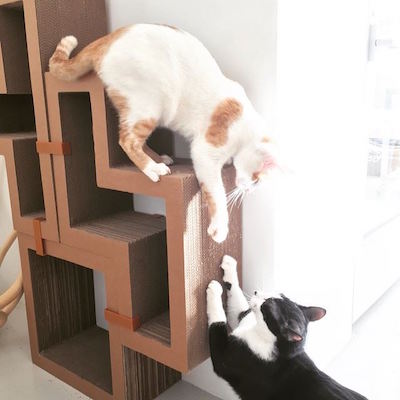Three cats from pleasant Hayes Valley hybrid teahouse and cat adoption center KitTea Cafe were diagnosed with an incurable viral disease that sometimes occurs in litters or cats in close proximity, as at adoption centers.
For context, SFist spoke with SFSPCA Client Care Supervisor Steve Murphy, who every year sees just a few cases of the disease, Feline Infectious Peritonitis or FIP. Since it inevitably takes the lives of some cats, "we give every adopter some information on it," Murphy says. "It's something that we want to let our adopters be aware of. [FIP] is a very rare but lethal disease that affects mostly younger cats and kittens."
"It is a truly heartbreaking disease and we are saddened any time we lose one of the cats we work so hard to give the best possible life," Wonder Cat Rescue, who work with the KitTea Cafe, tell SFist.
KitTea cafe, which opened after a few false starts and to much anticipation in late June, has been a popular destination for the cat-obsessed and adoption-curious. Working with the rescue service, the cafe encourages tea drinkers and casual visitors to consider adopting the kitties that play in an area separated from the tea lounge area by a glass partition.
At least two of the three cats diagnosed with FIP were litter-mates, and the cats' adopted families were offered condolences by Wonder Cat and KitTea as well as the chance to adopt again, free of charge or donation.
Says KitTea founder Courtney Hatt, "The best we can do is offer support to families who do adopt a kitten who ends up developing FIP, and give the cats the best possible experience on earth they can have before passing... As you can imagine the team at KitTea grow very close and attached to every kitten and cat that lives [with us], so it hits us very deep."
The SFPCA is working with the veterinary school of UC Davis on FIP research, but unfortunately, there's still no test for the disease and therefore perhaps nothing KitTea could have done. "That's what's difficult," says Murphy. "The figures that we quote are anywhere from a half a percent to three percent... but that doesn't make it any less tragic when it happens," he adds.

And, indeed, when the disease does strike there is little to be done. "Once, if it's determined to be FIP, the main thing is to sympathize with anyone who is dealing with illness or death of a pet. That can be a really tragic thing. [At the SFSCPA] we offer emotional support, and in the case of someone adopting a kitten from us that later died of FIP, we would reach out to them to see if there were other pets that were co-housed with that animal."
That's because, explains Murphy, it's not contagious in the way that some diseases are. "If an animal is co-housed, it doesn't mean that the other animals would immediately get it." But according to the American Association of Feline Practitioners and the Cornell Feline Health Center, the virus can be found in saliva and feces if they appear in large quantities, and that could infect other cats.
"The virus can also live in the environment for several weeks," the Association writes, while "the most common transmission... occurs when infected female cats pass along the virus to their kittens, usually when the kittens are between five and eight weeks of age."
One SFist source who wished to remain anonymous registered concerns as a former animal hospital employee. Is KitTea, the source wondered, a safe environment for cats, one working to create the best conditions for their welfare?
The Association adds that "newly acquired cats and any cats that are suspected of being infected should be separated from other cats. Preventing overcrowding, keeping cats current on vaccinations, and providing proper nutrition can also help decrease the occurrence of FIP in groups of cats."
But it sounds as if KitTea is doing all it conceivably can. Hatt adds that "after losing [the three] kittens to FIP since opening in June, [the Cafe is] planning to donate a portion of our cat lounge proceeds to the study and research to find a cure for FIP."
Since opening, Hatt says KitTea has found homes for 60 healthy cats.
Previously: KitTea Cat Cafe Coming In April!
KitTea Cafe via Facebook
